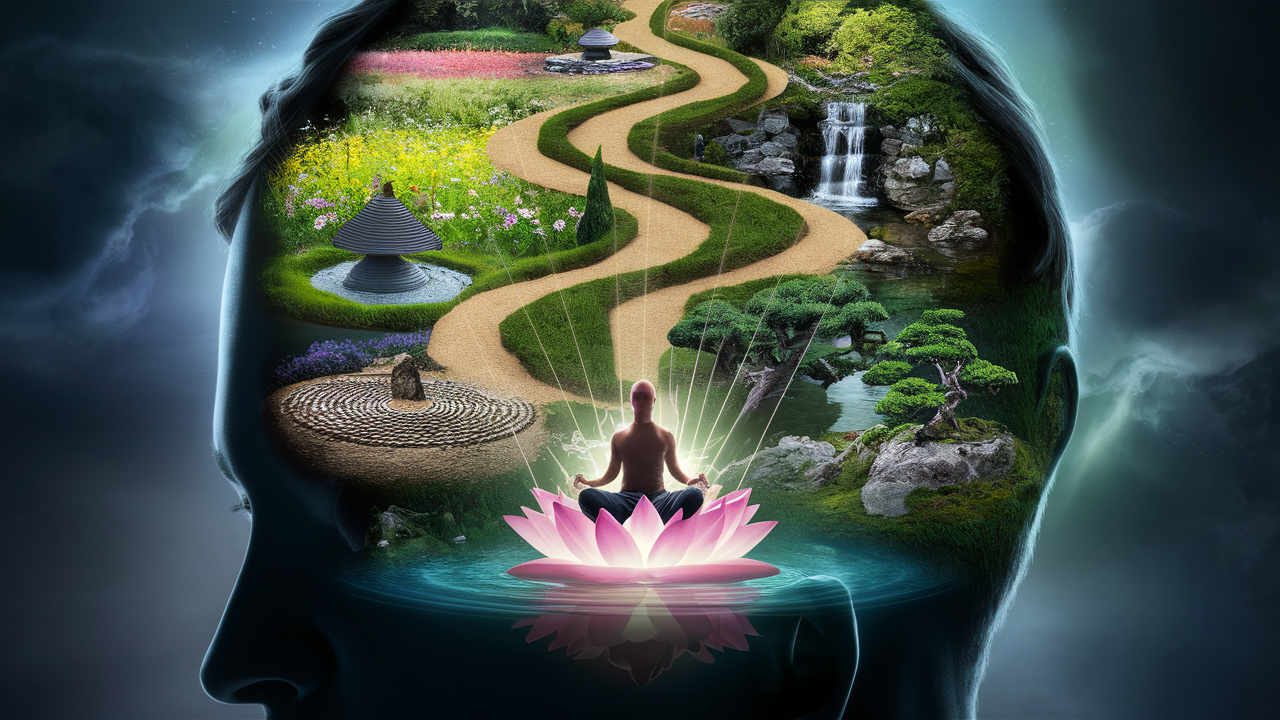Understanding Happiness and Peace
True contentment arises from cultivating inner peace rather than chasing temporary happiness through external pursuits. While society frequently equates happiness with attaining desires and accumulating material wealth, this approach yields a transient sense of fulfilment. In contrast, peace represents an abiding state of serenity and equilibrium that transcends circumstantial pleasures. By focusing inward and nurturing a profound connection with one’s authentic self, an unshakable foundation for lasting peace can be established, allowing one to navigate life’s inevitable ups and downs with grace and resilience.
The Illusion of Material Happiness

Materialism has become deeply ingrained in our societal pursuit of happiness, a conditioning that begins from a young age with the belief that joy stems from possessing material objects. We find ourselves in a perpetual chase, whether for the latest toy, a grander home, or a more prestigious career, constantly seeking external validation and superficial fulfilment. Yet, this material-driven happiness is inherently temporary and shallow, rooted in ignorance and a lack of profound understanding. It is an illusion that fails to provide lasting contentment, leaving us trapped in a cycle of desire and dissatisfaction as we continuously crave the next object or achievement to fill the void within.
The Conditioning of Childhood
Our journey towards seeking happiness through material means begins in childhood. We are taught to associate happiness with receiving gifts and achieving goals. This early conditioning forms a belief system that equates happiness with external achievements. As a result, we grow up chasing temporary pleasures, only to find ourselves in a never-ending cycle of desire and fulfilment.
Unveiling Inner Peace
 True peace, as taught by Param Gurudev, transcends external conditions and resides within as an unwavering state of being. Drawing inspiration from Parmatma Mahavir’s profound journey, wherein he renounced worldly pleasures and material possessions in pursuit of an enduring tranquillity, the essence of inner peace is unveiled. To attain this sublime state, one must embark on a path of self-reflection and heightened awareness, questioning deeply ingrained beliefs and desires. Param Gurudev guides us to turn our gaze inward, recognizing the true value of peace that lies beyond superficial cravings. Through this process of introspection, we let go of fleeting desires and cultivate a sense of contentment rooted in our authentic selves, independent of ever-changing circumstances.
True peace, as taught by Param Gurudev, transcends external conditions and resides within as an unwavering state of being. Drawing inspiration from Parmatma Mahavir’s profound journey, wherein he renounced worldly pleasures and material possessions in pursuit of an enduring tranquillity, the essence of inner peace is unveiled. To attain this sublime state, one must embark on a path of self-reflection and heightened awareness, questioning deeply ingrained beliefs and desires. Param Gurudev guides us to turn our gaze inward, recognizing the true value of peace that lies beyond superficial cravings. Through this process of introspection, we let go of fleeting desires and cultivate a sense of contentment rooted in our authentic selves, independent of ever-changing circumstances.
Practical Steps to Achieve Inner Peace
Param Gurudev’s guidance for cultivating inner peace emphasises the art of simplicity and presence. He advises reducing the incessant desires that fuel our relentless pursuit of more, and instead focusing our attention on what truly holds value and meaning. This involves consciously simplifying our lives, decluttering from the excess that breeds discontent, and fully embracing the beauty of the present moment. By releasing our grip on the constant need for acquisition and validation, we liberate ourselves from the chains of dissatisfaction. In this space of conscious living and minimalism, we discover the profound and enduring peace that arises from within, untethered from the fleeting nature of external circumstances.
The Difference Between Happiness and Peace

While happiness is commonly sought through material acquisitions and goal attainments, Param Gurudev elucidates that such happiness is inherently fleeting and temporary. The joy derived from new possessions or achievements inevitably dissipates, propelling us into a perpetual cycle of seeking newer sources of gratification. In contrast, peace represents a profound and enduring state that emanates from within, transcending dependence on external factors. It is a profound sense of inner equilibrium that remains steadfast, unperturbed by the ever-changing circumstances of life. Whereas happiness is a transitory emotion contingent upon favourable conditions, peace is an abiding presence that permeates our being, granting us the resilience and contentment to navigate life’s ebbs and flows with grace and equanimity.
The Role of Desires in Achieving Peace
Integral to the pursuit of peace is the ability to manage and transcend our desires, as illuminated by Param Gurudev’s teachings. Desires often breed restlessness and perpetual dissatisfaction, for when we relentlessly strive to fulfil them, contentment remains elusive. However, by consciously reducing our desires and redirecting our focus towards inner tranquillity, we pave the way for lasting peace. This transformative process involves a profound shift in mindset – from seeking external validation to cultivating joy and fulfilment from within ourselves. As we disentangle from the incessant cravings that bind us, we unlock the door to an abiding state of serenity, free from the turbulence of unquenchable desires
Cultivating a Peaceful Mind

Param Gurudev emphasises the importance of cultivating a peaceful mind through meditation and self-reflection. Meditation helps calm the mind and allows us to connect with our inner selves. Self-reflection helps us understand our thoughts and emotions, enabling us to manage them better. By practising these techniques, we can cultivate a peaceful mind that is resilient to external disturbances.
Conclusion
Param Gurudev’s teachings provide a roadmap to achieving true happiness through inner peace. By understanding the difference between transient happiness and enduring peace, we can shift our focus from external achievements to cultivating inner tranquillity. This journey requires self-reflection, awareness, and a willingness to let go of superficial desires. Ultimately, it is through inner peace that we find true fulfilment and serenity in life.





